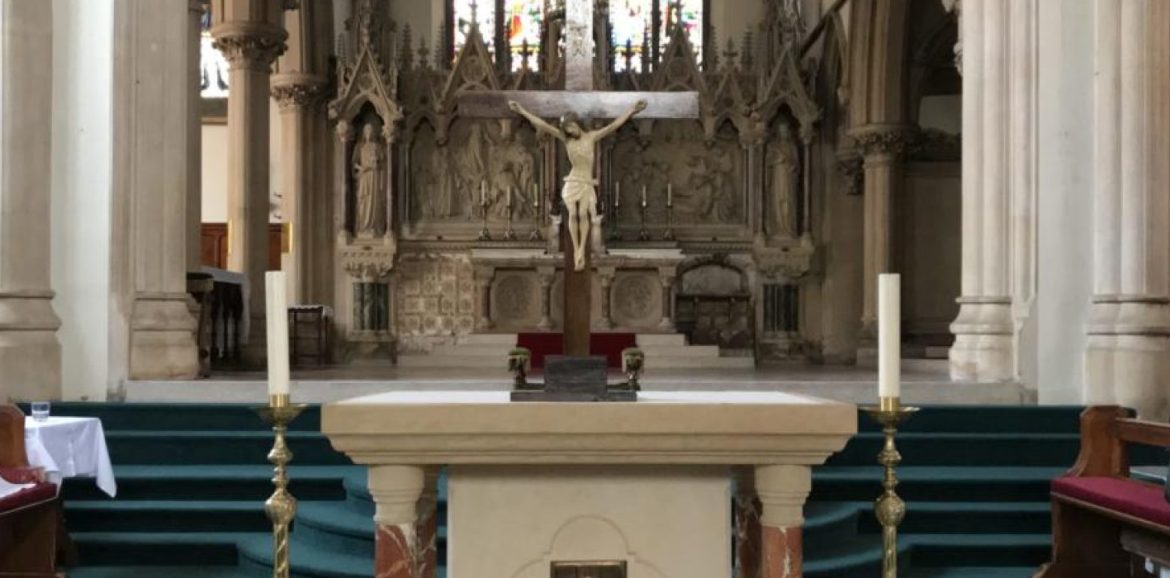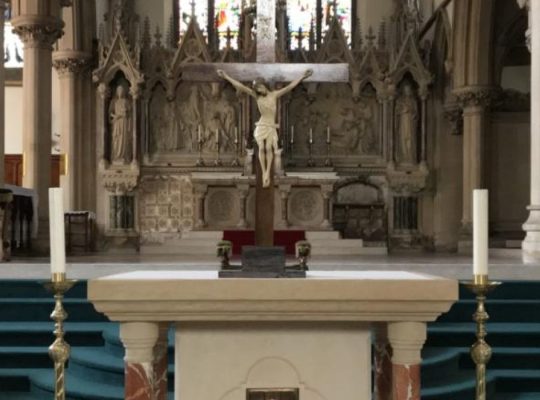Over the next three Sunday’s we shall read a significant portion of Chapter Fourteen and all of Chapter Fifteen of Saint Luke. After listening last week about the ‘Narrow Gate’ and the question ‘Sir, will there be only a few saved?’ We now hear some of Jesus’ parables on ‘Mercy.’ The majority of parables are set within Banquets or Feasts, but their framework is the ‘Great Banquet’ at the end of time and the paradoxical conditions laid on those who wish to share in it.
Our Gospel today, covers the first part of Chapter Fourteen, which falls within the framework of a supper to which Jesus had been invited by ‘a ruler of the Pharisees.’ Most of the other guests are of the Pharisee and lawyer class, ‘religious’ men, fervent practitioners with a sophisticated knowledge of the Law. The incident is not isolated in the Third Gospel, which reports at least two other invitations of the same kind. (Luke 7: 36-50; a supper during which a sinful woman came to Jesus and was told by him ‘Go and sin no more.’ 11 :37-52. A supper which Jesus appraises the legalism of the Pharisees and the lawyers). Luke has no systematic bias against the Pharisees. Was not Paul his master, one of them and proud of the fact? Perhaps the evangelist’s radicalism inclines him to a certain degree of admiration for these rigorous observers of the Law; Ah! If only they could be converted like Saul of Tarsus! In any case, Luke wants to emphasize that Jesus was quite ready to bring them salvation. Indeed, he takes care not to implicate them in Jesus’ death.
Luke recoups several table scenes, and one cannot read them without thinking of what they evoke in the Bible and for the Christian: the community at table, the sharing of food, and finally, participation in the heavenly banquet in the kingdom, of which the Eucharist is the sacrament. It was thus at the house of ‘one of the ruling Pharisees’ that Jesus speaks what is commonly known as ‘table talk,’ which is not limited to a collection of ‘catch phrases.’ It is a portion of this ‘table talk’ that is recalled in to-days Gospel.
We should note, this is not an ordinary meal: it takes place ‘on the sabbath.’ Did the Pharisee meet Jesus at the synagogue service and invite him to join his other guests, Pharisees and lawyers, for the supper that had been prepared? It is possible, since, as we know, Jesus regularly went to the synagogue on the Sabbath.
On entering his hosts house to share a meal, Jesus sees that the guests all choose the best seats. W should not regard this fact indignantly, even if the evangelist elsewhere speaks of the Pharisees as coveting honour. After all, they were notable people, that would normally be seated in the highest places. Even if we don’t dash for the chairs, none of us is surprised if we are seated in a place of honour at a supper to which we have been invited. It would be wrong to demand a place at the head of the table, or, even worse, to act out a show of humility, taking a lower place while knowing perfectly well that someone will make us move higher. It is clearly not this that is the issue here, Jesus, to whom his host undoubtedly gave not only a place of honour but the first place, offers no banal wisdom, no elementary lesson in proper behaviour. Luke would certainly not have troubled to remember this episode if it had no other significance.
One notes first of all that, in the parable, it is not just any meal, but a wedding banquet. This detail is important. It is, in fact, the first and decisive key for a proper reading and understanding of the parable. If every supper evokes for the believer the ‘Table of the Lord’ — both of the Eucharist and of the kingdom — a wedding banquet, especially when Jesus speaks of it and the evangelist records it as such, is an unambiguous reference to the ‘eternal wedding feast.’ The parable is unquestionably to be understood in this perspective.
If there is some lingering doubt, if one is tempted to regard it as a very simple, basic parable, the final proclamation will suffice: ‘For everyone who exalts himself shall be humbled, but the one who humbles himself shall be exalted.’ The use of the passive is characteristically biblical; it allows one to refer the action to God — he who will humble and exalt — without pronouncing his ineffable name. This dictum is found in several locations in the Gospels. It must have made a deep impression on the minds of the first disciples who understood it to be a principle of life that conforms to the will of God. ‘Everyone who exalts himself shall be humbled, but the one who humbles himself shall be exalted’ is, in the context of this ‘table talk,’ a teaching about the kingdom of God and the revelation, by Jesus of the path by which it must be entered. ‘He has cast the mighty from their thrones and raised up the lowly.’ The Lord will sustain the lowly; the wicked he casts to the ground — ‘For the one who is least among you is the one who is the greatest’Jesus had always particularly insisted on this ‘law of the kingdom’ that he had come to preach, and to which he grants access. The Gospels speak of it forcefully throughout.
Is it a ‘law of the kingdom?’ therefore, confirmed by the sovereign authority of Jesus? Yes, certainly; but even more, this saying turns our attention to the one who proclaims it, in whom it has its complete fulfilment. ‘He humbles himself, becoming obedient, to death, even death on a cross. Because of this, God greatly exalted him.’ Saint Augustine spoke of humility as a ‘sign of Christ,’ an expression to be understood in its strongest sense: at once a ‘sign’ that reveals Christ and allows the Christian to recognise him as by the seal of authority, which points to a greater, invisible reality — the kingdom— like a sacrament. ‘Jesus Christ is a God whom one approaches without pride, before whom one may humble oneself without despair.’
Reading and re-reading this parable reveals another significant feature. Jesus does not address himself directly to the guests whom he saw choose the highest seats. Surely, this is not merely out of delicacy, not wishing to offend them while offering a lesson. The formulation in the second person — ‘When you are invited …. do not recline at table in the place of honour…. [instead] go and take the lowest place so that when the host comes to you he may say…..’ — gives the parable general significance and indicates that it is not addressed only to those who heard it first. Such a formulation is familiar to us, since a number of proverbs use a similar ‘you.’
Jesus now turns to the man who had invited him. Nevertheless, he gives — under an imperative form — a teaching, a warning that does not merely apply to his interlocutor ‘that day.’ The ‘you’ has the same significance it had in the parable. Jesus is speaking not only of the meal in which he is participating, but a lunch or a dinner, which means every lunch or every dinner. He is not rebuking his host, who not only invited his rich friends and relatives but also Jesus and perhaps some of his disciples.
The supper is taken as the most concrete expression of a broader welcoming to others. It would be absurd to interpret Jesus as saying: ‘Share your meal with anyone except your friends, fellows, relatives,’ And likewise: ‘Accept invitations only if they do not come from them.’ Not only is it absurd, it is in contradiction to what Jesus himself did. He ate at Peter’s home (Luke 4:38-39) He went Mary and Martha’s House (John 12:1-11) To Zaccchaeus’ house (Luke 19:1-10). But to name only a few examples.
What Jesus says about one’s choice of guests is valuable always and everywhere; it applies in every situation, with the invitation to dine becoming exemplary. Nothing about this teaching is even remotely reminiscent of a precept of human wisdom, a lesson in good manners. It is a paradox that comes from the Gospel itself, for Jesus’ commandment goes counter to human wisdom, to all polite behaviour.
To receive into one’s communion — to invite to one’s table — to love totally, not only without calculating personal gain, but in a totally disinterested manner. To turn resolutely toward ‘beggars and the crippled, the lame and the blind,’ all those who have nothing to give in return, who are deemed to be of no account, who are even excluded from participation in worship. Such is Jesus’ commandment, diametrically opposed to human law and wisdom. It would be an outrageous demand, unthinkable, impossible to take seriously, if it did not come from Jesus, if it had not been taken seriously throughout the centuries by an uninterrupted line of disciples, if it were not an imitation of God himself who grants us the grace to begin this road and to follow it to its end, the joy ‘at the resurrection of the dead.’
Once more, it is no law that Jesus gives us in a distant way. He does not merely say: ‘Follow my example,’but ‘understand who I am, why I act thus. If you are my disciples, become what you are. Christians in the true sense of the name, this beautiful name that has been given you and which you bear. Children of God, imitate the conduct of your Father, of your family. There, and there alone, is found imperishable happiness.’
Jesus, the Son of God who reveals the Father, makes himself, without reservation, without waiting for anything in return, the friend of the weak, the poor, the disinherited, the sick who need a doctor, even if they are filled with earthly goods; he does so to the point of giving his life. For if he had one thought of avoiding death, he could act differently, in such a way that one day, in Jerusalem where he handed himself over, the crowd would prefer Barabbas. One can imagine him speaking of himself when he says: ‘If you [only] love those who love you, what credit is that to you? If you do good [only] to those who do good to you, how can you claim any credit? Even sinners do the same. If you lend [only] to those from whom you expect repayment what credit [is] that to you? Even sinners lend to sinners, and get back the same amount. Love your enemies and do good to them, and lend expecting nothing back; then your reward will be great and you will be children of the Most High, for he himself is good to the ungrateful and the wicked.’ (Luke 6:32-35) Such are the words the disciples must always have in their hearts and souls, in their thoughts and in their deeds, and above all when we gather for the Eucharist — the Supper par excellence.
We have no right to raise or thrust ourselves into places of honour. But God’s strength is great, and it is on his grace that we rely : ‘He exalts the humble,’ He seats them at Table and, showing them the example, he, the Master, goes among them as a servant. Happy are those who are called to the Lord’s supper.
‘Lord I am not worthy to enter under your roof, but only say the word and my soul shall be healed.’


